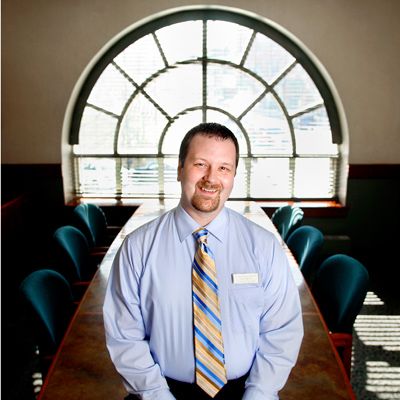Camden National's Horizons program sets a path toward the executive suite
Jared Merritt recalls standing on a platform, 20 feet above ground, staring down at a horizontal telephone pole that he was supposed to cross.
Beneath him were the other eight members of his leadership training class from Camden National Bank, ready to steady his harness and help him make the trek across the pole as part of a team-building exercise at Camp Kieve.
"But I've had a lifelong fear of heights, and even though I climbed to the platform, I took one step out and could not go forward," says the senior financial analyst and associate vice president. "I was very disappointed. I let myself and my team down."
But reflecting on the moment, Merritt says that experience gave him one of the most important lessons he learned in the nine-month leadership course: Get out of your comfort zone and take risks.
Merritt is one of the 35 employees to graduate from Camden National's internal leadership training program called Horizons. Started in 2009, the program identifies top performers within the bank's 450 employees to groom for management and eventual leadership roles. The unique, three-tier program is designed and executed in house to foster future leaders from the bank's own ranks.
"The talent pool is less and less, and when you take into account Maine's shifting population, we want to make sure we attract and retain really good people," says President and CEO Gregory Dufour. "These are leadership opportunities that can't be replicated elsewhere."
Horizons sprang from a desire to ensure the bank has a well-trained crop of managers, and to address the fallout that has crept through banking ranks as large banks scale back management training to cut costs. For decades, bankers — including Dufour — learned the management ropes at a big national bank and carried that training with them to new careers in smaller community banks.
"But they don't have those [training programs] anymore," say Dufour. "Creating Horizons was a way for us to have a training program to educate our own work force."
The 137-year-old bank is additionally challenged by its geography. Eighty miles north and east of Portland, the community has relatively little churn in its work force, which puts a premium on keeping skilled people, says Dufour. The bank, with $2.26 billion in assets as of Dec. 31, has 38 branches throughout midcoast and central Maine. It is the second-largest Maine-based bank behind Bangor Savings Bank, which had $2.56 billion in assets in December 2011 and 700 employees.
Getting in
Horizons participants are nominated by co-workers or they can self nominate; generally there are more than two applications for each opening, says Carolyn Crosby, senior vice president of human resources and development director for the bank.
"It's seen by the selected employees as an honor and a recognition that the company believes in their potential and wants to invest in them," she says. "Also, we pride ourselves on promoting from within, and this program helps prepare people internally for their next-level jobs."
While the majority of the training comes from in-house managers, the bank does bring in specialists when warranted and sends Horizons participants to the annual Maine Bankers Association conference on emerging leaders. Chris Pinkham, president of MBA, says the annual conference is an attempt to provide professional development training for bankers across the state, and offer them an opportunity to network with their peers. Banks use the conference — this year scheduled for November — to amplify whatever internal training programs they might offer, says Pinkham.
Dufour says one benefit of providing the training in house is the ability to customize the curriculum to reflect Camden National values and priorities. Another is cost. Week-long leadership training offered by national organizations such as the American Bankers Association runs between $3,000 and $4,000 per person.
Although Crosby doesn't have a cost/benefit analysis for Horizons, she can point to an impressive retention rate. Ninety-one percent of the employees who've taken the Horizons training are still with the company.
The tiers
The Horizons program has three levels, with 10 openings annually at each level. The first tier, the 100 level, is designed to train prospects to become officers within the bank. For nine months, participants meet for training once or twice a month. At this level, participants learn basic banking principles. Managers from each department explain their roles and how their departments relate to and differentiate from others. Participants also get basic supervisory training — a priority based on a corporate culture survey that showed a majority of employees wanted their supervisors to receive better training, says Dufour.
At the 200 level, which is geared toward officers and associate vice presidents, participants are instructed in the finer aspects of banking. For instance, they are taught how Camden National manages risk by talking with the bank's CFO about balancing interest rates with asset liability. Or they immerse themselves in understanding the impact of the Patriot Act on the bank's technology and security systems.
"They really get to see the inner workings of the bank at this level," says Dufour.
There's also a field trip to Augusta where participants meet with local lawmakers and Pinkham to learn how bills related to banking are made and the impact of lobbying. Dufour says it was an eye opener for a recent class to learn five or 10 phone calls from constituents on a topic will get a legislator's attention.
"I think it was interesting for them," says Pinkham, who instructed the class while a bill affecting lending regulations was wending its way through the Legislature. "I think there was a whole new recognition of the background of government relations — where there are lots of pencils and yellow pads and people rolling up their sleeves to work on something. There was a nice connection between that and the impact of regulatory control."
Merritt, the financial analyst, says the Horizons training gave him a chance to see the banking world from a different perspective than his accounting niche usually affords.
"One day we worked on team building, then we attended a three-day session at the Northern New England School of Banking in Portsmouth. ... There was another session on communication and establishing a circle of influence," he says. "In every session my expectations were surpassed."
The final level, 300, will launch this spring, says Crosby. Again restricted to a class of 10, the program is offered to employees at the vice president or senior vice president level, representing the pool of talent from which the bank will likely recruit its top management. The curriculum will be much more intense, says Dufour, because "I want the next CEO to come from inside the company."
Crosby says the focus of the 300 level training is strategy and understanding the intricacies of executing it throughout the bank. The 300-level curriculum is in the final stages of vetting by Dufour and the bank's executive committee.
Projects integrated with training
One aspect of the training that has particularly impressed Crosby is the projects each class completes. At the 100 level, trainees must come up with an innovation project while the 200-level participants must devise a project that benefits the community and qualifies the bank for Community Reinvestment Act credits. Banks are assessed on CRA credits when audited by their regulatory authorities; those with "outstanding" CRA ratings are better positioned to gain regulatory favor when opening new branches or performing other operations that require regulatory approval, such as buying another bank.
The 300 class will also be charged with a project to benefit the community, possibly along the lines of mentorship opportunities, says Crosby.
Arissa Egan, a marketing officer, graduated last December from the Horizons 100 class. She is waiting on word from the bank's executive committee on whether Camden National will adopt new technology the class created as its innovation project. Until the committee gives it a thumbs up or down, Egan can't divulge the details except to say it's technology that will benefit customers and shareholders alike.
"It will touch on all our constituencies," she says. "It also should help develop closer ties [between the bank] and particular markets."
A newcomer to banking when she joined Camden National four years ago, she says she found the training especially helpful in understanding the complexities of the banking industry and instrumental in assessing her skills as a manager. But the relationships she developed with her Horizons 100 classmates are probably the most enduring benefit of the program.
"We became resources for each other," she says. "I now know people in positions in Blue Hill and Portland and other places who I can call and ask questions. We can consult with each other and broaden our perspectives. For me, it was a critical part of the program. "
Merritt, the Horizons member who failed at the aerial telephone pole trek, nevertheless has found plenty of success through the program. Last week he and his Horizons 200 classmates were getting deep instruction in underwriting and loan processing — and the subtle nuances of how loans work from application to closing — from Tim Nightingale, an executive vice president and senior lending officer.
Merritt had been a banker for six years with Union Trust before it was acquired by Camden National four years ago. Although he received training through Union Trust, it wasn't on the same level as the Horizons program from which he intends to graduate in June.
"This commitment spans a whole year, it makes you feel valued. It's not a one-day session or a weekend, it really is a commitment," he says. "I think it's pretty unique."
And in a happy postscript, Merritt says later in the Camp Kieve training, he redeemed himself.
"I aced the zip line exercise," he says with a laugh. "It was quite the experience and a lot easier than stepping across that telephone pole."
Read more















Comments